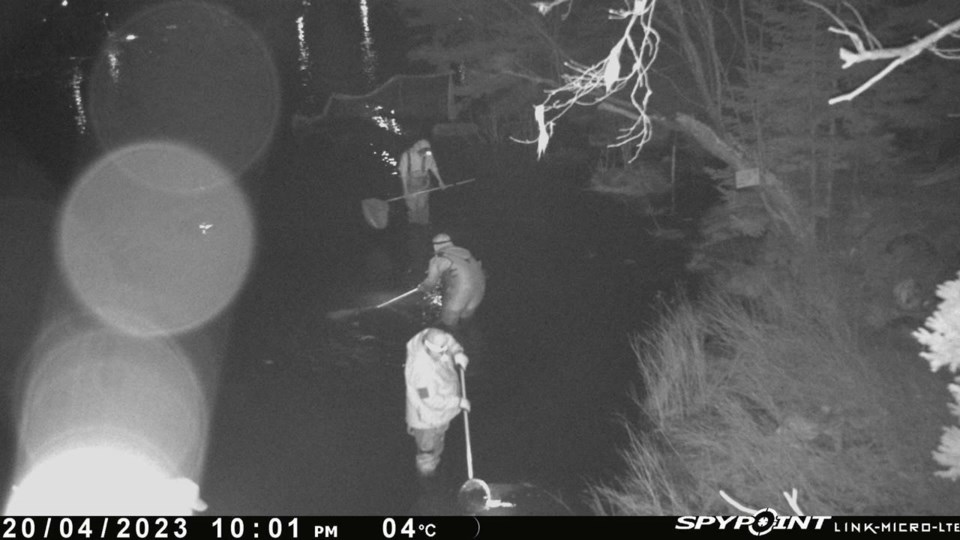HALIFAX — Photographs have been released showing people fishing for baby eels in Nova Scotia despite the federal government's recent decision to shut down the contentious fishery.
The tiny eels, known as elvers, are flown to Asia where they are grown for food. They are fished at night in tidal rivers each spring as they migrate inland from the ocean, with prices last year hitting $5,000 a kilogram.
The federal Fisheries Department closed the elver fishery for 45 days starting April 15 because of alleged poaching and reports of violence among fishers.
Commercial fishers say most of what they contend is poaching is done by First Nations fishers who are not part of federal agreements, although those unlicensed Indigenous fishers counter that they are asserting treaty rights.
Stanley King, owner of a licensed elver-fishing company, provided photos of people fishing for elvers in Nova Scotia rivers despite the temporary ban. He said in an interview he forwarded his photos to the federal Fisheries Department, identifying the rivers and the times of the fishing.
King and eight other commercial licence holders are meeting with federal officials and politicians to lobby against the moratorium. The moratorium is also being applied against several Indigenous communities in the Maritimes that hold elver licences.
"The photos tell me the ministerial memo to shut down the fishery has been ineffective and it is only punishing law-abiding licence holders," King said in a telephone interview from Ottawa.
He said the photos were obtained by motion-activated cameras that use infrared technology to take photographs at night. "I send daily updates to DFO enforcement telling them the time and places that the illegal poaching is going on and I get no response back, and they don't go to the rivers to enforce," he said.
Jeff Woodland, a spokesman for federal Fisheries Minister Joyce Murray, said Ottawa's priorities are public safety and conservation of the eel stock.
"As was the case even before the fishery opened and continues to be the case, conservation and protection officers are working alongside the RCMP and other agencies to combat illegal elver fishing and enforce the law," he wrote.
However, Cheryl Maloney, a Mi'kmaq woman who advocates for treaty rights, said in an interview that she doesn't view Indigenous people catching elvers during the moratorium as poachers.
She took part in the fishery before the moratorium and said she was able to co-operate with commercial fishers on the same small river.
Maloney said early in the season, fisheries officers and RCMP failed to uphold the rights of Indigenous fishers established in a 1999 Supreme Court of Canada decision, which confirmed a treaty right to fish for a moderate livelihood. The decision also says the right is subject to federal regulation, with the "primary" focus of that regulation to be for conservation of the stocks.
Maloney said the historic ruling raises the question whether the minister has the right to impose the shutdown on the Indigenous fishery.
"If (Murray) made her decision based on science and conservation, more (Mi'kmaq) people would be abiding by it. But what happened on the water was (enforcement officers) failed to keep the peace. When the season first started out, the DFO and RCMP wasn't policing anything. They were just letting us fight it out on the river," she said.
Maloney said Indigenous people are prepared to assert their right to catch elvers. "If ... we back down now, we'll never get back on the water," she said.
For the second consecutive year, Ottawa this year gave Indigenous fishers 14 per cent of the commercial quota in recognition of the treaty right to make a moderate living from fishing.
Brian Giroux of Shelburne Elver said the transfer of licences cost his co-op about $1 million worth of quota annually this year and last. He is part of a court challenge arguing the federal policy failed to compensate commercial fishers for the loss of those licences.
He said the fishery has now degenerated into an unregulated mess, with both Indigenous and unlicensed non-Indigenous fishers on the rivers and conservation largely ignored.
"We warned DFO in 2016, 2017 and in 2020 it was closed for the first time by massive poaching ... . It's just got worse and worse and worse," he said Tuesday.
Murray said at the time of the shutdown that poachers were coming from outside the Maritimes, and even from outside Canada, in what amounted to a “huge escalation” of illegal fishing.
This report by The Canadian Press was first published April 25, 2023.
Michael Tutton, The Canadian Press



